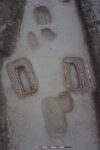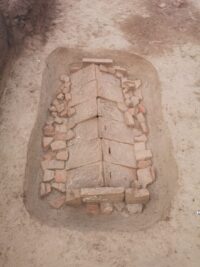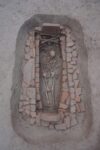 Irrigation works in the town of San Martino dall’Argine outside of Mantua have revealed the presence of a small Late Roman cemetery dating to the early 6th century. Excavations along the canal route have unearthed eleven tombs five feet under the surface. They are contained in a small area along a stretch less than a quarter mile long of the Ca de Marcotti street, but archaeologists believe there may be other tombs on the site.
Irrigation works in the town of San Martino dall’Argine outside of Mantua have revealed the presence of a small Late Roman cemetery dating to the early 6th century. Excavations along the canal route have unearthed eleven tombs five feet under the surface. They are contained in a small area along a stretch less than a quarter mile long of the Ca de Marcotti street, but archaeologists believe there may be other tombs on the site.
The graves are arranged in four distinct groupings separated by a hundred feet or so between them. Three of the 11 tombs are in the “capuccina” style,  a burial form that was popular in the Late Roman Imperial era for members of the lower classes. They were made by arranging bricks or tegulae (terracotta roof tiles) to line a grave and then tilting larger ones against each other to form a pitched roof structure. The skeletal remains found inside the graves are mostly adults but there were also some children buried there.
a burial form that was popular in the Late Roman Imperial era for members of the lower classes. They were made by arranging bricks or tegulae (terracotta roof tiles) to line a grave and then tilting larger ones against each other to form a pitched roof structure. The skeletal remains found inside the graves are mostly adults but there were also some children buried there.
As is common in capuccina graves, no grave goods were buried with the dead. Radiocarbon dating of the bones will narrow down when the deceased were buried. Right now, the ca. 500 A.D. dating is an estimate based on the reused brick materials and the construction techniques in the more structured tombs. Borrowed architectural elements may have come from a nearby Roman settlement — the Roman village of Bedriacum was discovered five miles away in 1836 — and may have taken place later than the 6th century as Roman building materials were actively recycled in the early Middle Ages as well.
 The tombs have now been removed and transported to a secure location for study and conservation. There’s already talk about creating a museum or archaeological park dedicated to the San Martino ancient cemetery. Excavations will continue in the hope of discovering more of the cemetery and perhaps the settlement that may have been the source of the tile used to craft the tombs.
The tombs have now been removed and transported to a secure location for study and conservation. There’s already talk about creating a museum or archaeological park dedicated to the San Martino ancient cemetery. Excavations will continue in the hope of discovering more of the cemetery and perhaps the settlement that may have been the source of the tile used to craft the tombs.